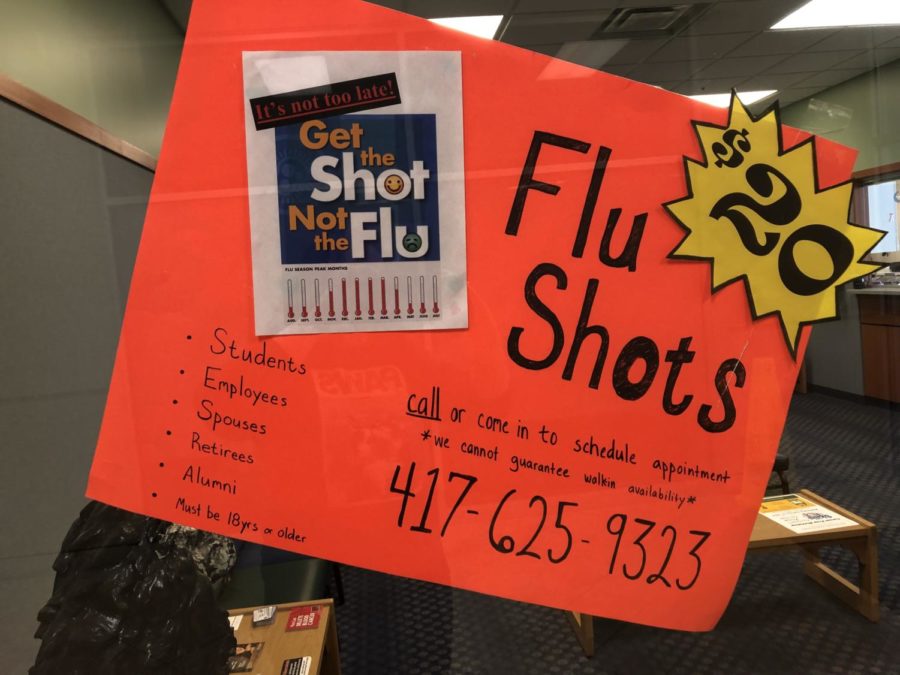Southern not immune to national flu epidemic
Susannah Schrader, executive editor
Southern’s Wilcoxon Health Clinic is still offering low-cost flu shots, which the CDC and the medical community agrees that it is not too late to get. Though it is less effective than this year than in other years, it can lessen your symptoms if you do get the flu despite getting the shot.
Throughout the entire campus, desks remain vacant as students stay home with the flu. Some of the students attending class can be heard coughing and sniffling as the professor lectures. The flu has struck again.
During Jan. 2018, Missouri encountered a major increase in influenza, or flu, cases. Students and faculty at Missouri Southern are experiencing symptoms as the flu spreads throughout Missouri. Students arrive to class with tissues stuffed in their pockets and cough drops thrown haphazardly into their backpacks among the notebooks and pens.
The flu season normally runs from October to May, but in Missouri it has produced over 53,000 cases in January alone, according to the Missouri Department of Health & Senior Services. The health department encourages people experiencing symptoms (fever, cough, sore throat, runny or stuffy nose, chills, and fatigue) to avoid contact with others because influenza is contagious.
Fighting the Flu
Handwashing is a key part of fighting against influenza. When stumbling into a public restroom, one might find fellow students or faculty viciously scrubbing their hands. This is a good practice on a general basis but also a precaution because of the diseases spreading rapidly down the halls.
Not everyone has the same disease when they get diagnosed or self-diagnose with the flu. There are three types of flu: A, B, and C, each with its own set of rules by which it chooses victims. Type C does not typically cause people to become very ill, according to the Centers for Disease Control and Prevention (CDC).
As this article is being read, different types of diseases spread through the air, claiming their victims. One might be wondering how to avoid the seemingly unavoidable. There are many online resources available to help educate people about influenza.
Flu Near You (flunearyou.org) provides information about local flu percentages based on voluntary participation and crowdsourced data. Their belief is that early detection and early response are key to preventing influenza from spreading. Their website allows people to report their symptoms and the cases can be tracked on flunearyou.org. The website also has “Flu News,” which features articles about flu season, prevention, and more.
Should we vaccinate?
What caused this increase in influenza? Some argue that it was a result of individuals’ refusal to get a flu vaccination. The single best way to protect against the flu is to get vaccinated each year, according to CDC, but some people believe the vaccination will cause physical or psychological harm.
The flu virus strains mutate over time and replace older strains, which is why people should get flu shots each year, according to CDC. Your body will develop an immunity to the most recent strains when you are vaccinated.
“I do believe that people should get the flu vaccine,” said Kaitlin Fraser, a senior biology major. “Even if you do get the flu after getting the shot, it can lessen your symptoms and get you back on your feet sooner.”
Even though many people have survived their case of the flu, it is a serious disease that has been known to hospitalize people or even lead to death. This disease may affect people differently, but each year millions of people get the flu. Within just one year, thousands of people will die from flu-related causes, according to CDC.
Your donation will support the student journalists of Missouri Southern State University. Your contribution will allow us to purchase equipment and cover our annual website hosting costs.

































